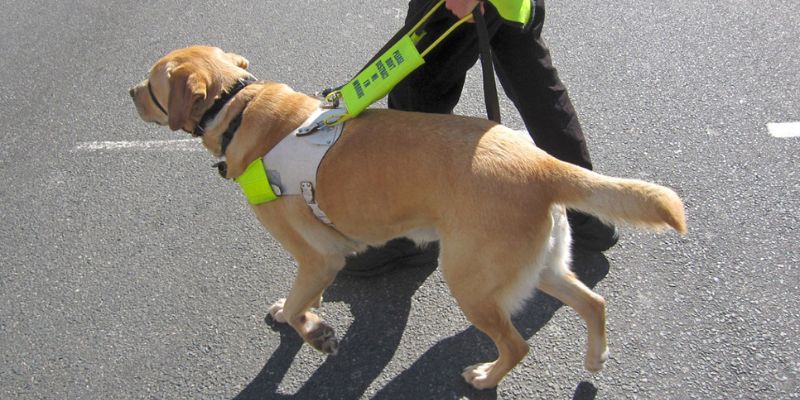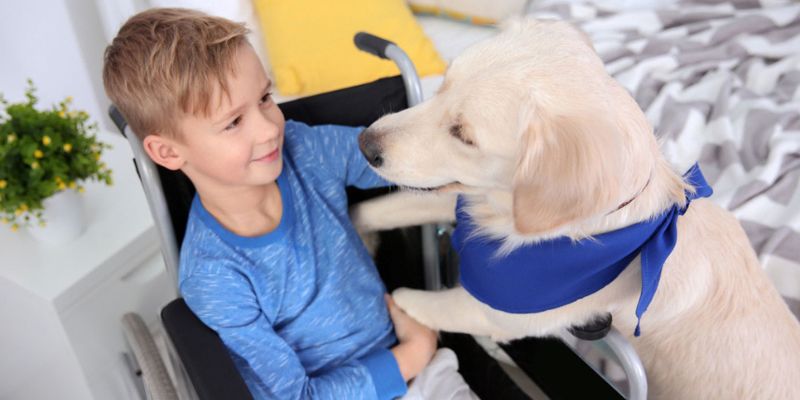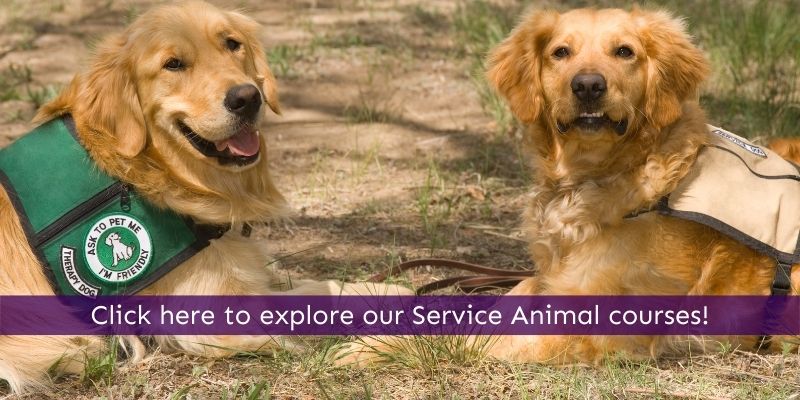Service animals can be trained to support those who require assistance. Service animals are specifically trained to support humans in a variety of ways, for several requirements. Owners of a service animal may require additional support from their service animal for physical, cognitive, mental, or emotional reasons.
You may be considering training your pet for a personal reason, or you might want to go into animal therapy as a professional career. There are many options for training with animals. So firstly, let’s explore the different types of service animals and what type of service they are providing.
The most common support animal is usually specific breeds of dogs such as Retrievers, Border Collies, Labradors, and German shepherds. This is because these breeds have acute senses and are the most adaptable breeds for training with humans.
Guide Dogs
Guide dogs are trained canines who aid disabled individuals who have a specific need. For example, guide dogs can be trained to support the blind, deaf, individuals with learning difficulties and the physically disabled. These types of guide dogs are exceptionally clever and are taught skills by Assistant Dog Trainers. Their goal is to train these dogs to provide a variety of supportive tasks for their owner. Tasks can include anything from crossing the road safely, opening doors or even fetching items. A common misconception is that guide dogs have a strict ‘working’ relationship with their owner or care-giver. This is simply untrue. A guide dog can be a family dog and, in fact, they are likely to have a strong bond with that individual.
Another type of guide dog is known as Mobility Assistance Dogs. These dogs are specially trained for wheelchair users and those who have physical disabilities. As physical disabilities can be broad-ranging, these types of dogs will need to be trained to meet the specific needs of their owner. For example, an individual may need a heavily built dog for strength-related tasks and activities such as lifting and moving objects.
It is inappropriate to approach a guide dog when they are working or supporting their owner. It is not suitable to pat, stroke or call to a guide dog as this may distract them from an important task. You can usually identify a guide dog from their high-vis jackets or harnesses. It is polite to bear this in mind and if you ever come across a guide dog, keep your distance, and speak to the owner before interacting in any way.

Community and Police dogs
Dogs who work within our community for local services are not traditionally seen as ‘support dogs’ but they do support people and provide a service that has similar roles as service dogs.
Police dogs for example are usually selected for their strength, speed, instincts, senses and ability to learn. These types of dogs are trained to undertake a variety of tasks to support the police, army, and even the air forces. They are often trained by a dog handler who has a qualification in canine behaviour and dog training.
They may be trained to prevent or determine crimes such as detecting explosives, identifying hidden objects, locating missing people or even controlling or protecting crowds at a protest.
Medical Support Dogs
Medical support dogs have unique abilities to detect events before they happen. They are often referred to as preventative alert dogs and can be trained to step in before a medical crisis is about to occur. Medical support dogs have a strong sense of smell that can detect chemical changes in their owners’ body and know-how and when to react. Diabetic alert dogs, for example, can sense an increase or decrease of glucose levels in a person and will act accordingly to prevent an emergency.
Seizure or medical alert dogs are another type that can be trained for certain precautions. They are trained to detect certain physical, behavioural, and even chemical changes in their owner and can prevent them from having a fit, seizure, or physical episode.
To start a career as an Assisted Dog trainer you will need to study an Ofqual regulated qualification that meets the Defra animal activity licence. The Level 3 Diploma in Assistance Dog Training is an online, theory-based course designed to teach you the core elements in assistance dog training and to help you get employment in this sector. You will need to obtain hands-on experience working with dogs and therefore it is recommended that you seek volunteering or work experience to support your application.

Psychiatric, Therapy and Emotional Support Animals
Psychiatric service dogs are trained to step in as a comfort for their owner in times of distress. They are usually hand-picked due to their energy and calm nature. They can be especially helpful for those who suffer from mental illnesses such as PTSD, anxiety or depression and they can be trained to respond to signals that the owner is giving off. For example, psychiatric dogs can comfort their owner which may help alleviate stress and bring their heart rate down in certain situations. Psychiatric service dogs will be close with their owner and once trained, will quickly become a key member of the family.
Pet therapy and emotional support animals are not the same as psychiatric service dogs. Support animals do not ‘live’ with their carers and instead, they provide short term comfort or ‘visits’ to those individuals who need occasional support.
There is also a common misconception that emotional support animals are just dogs. This is not entirely true. Human support and intervention services can be provided by cats, rabbits, horses and even dolphins.
Animal Assistance Intervention is a type of therapy that can be useful for those in need. It can be used as a type of treatment for a variety of individuals and patients. For example animal assisted intervention can be used for short term interactions with the elderly at a hospice, sick or injured patients at a hospital or even for children to aid their learning and development.
It is not only emotional support that can be used as an alternative treatment, animal, assisted intervention can be used to provide rehabilitation for offenders and even support disease and disabilities.
Animal Assisted Intervention is a career path you can take if you study a Level 3 Diploma.
The Level 3 Diploma in Animal Assisted Intervention Is the required training for those who are interested in starting a career as an animal trainer in this field.
Also, if you adore animals, you can keep track of all upcoming animal awareness days and events with our FREE calendar! Download it here.

















